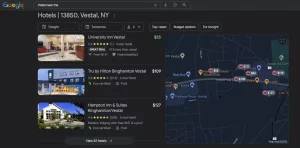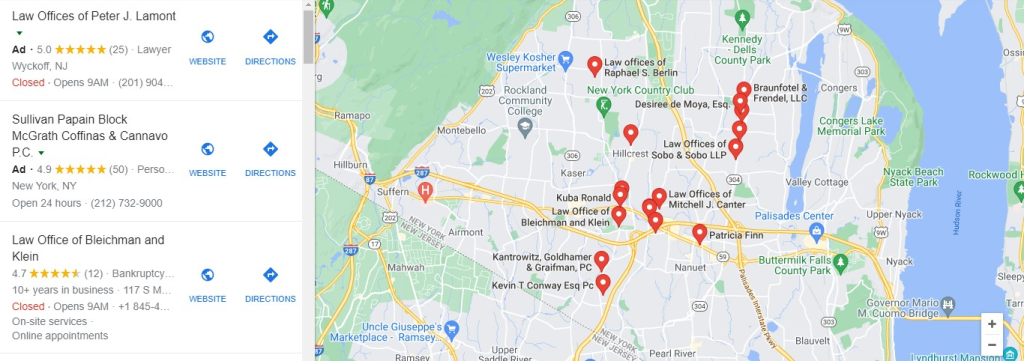What is local SEO
Google published a research study in 2014 called “Understanding Consumer Local Search Behavior’.
This study reveals numerous valuable insights into the state of local search in the digital age.
Google, Bing, Yahoo, and other search engines have increased their efforts to tackle this market by providing the most relevant listing within their search results, and thus have become the go-to resource for local information.
Local SEO has become a very complex and unique subset within the SEO practice globally.
The Opportunities for local search are huge.
The main goal of local SEO is to help a website or local business rank better in local search engine results. This means that it focuses on optimizing a website to rank on the front page of search engines like Google and Bing when certain products, services, or information are searched for in a targeted location. The most important elements to focus on are your business name, address, phone number, website, and categories.
The screenshot below is an image of a “map pack” result for the search term “Hotel Near me” and the location is Binghamton City in New York

Why is local SEO Important for small businesses?
Local SEO (Search Engine Optimization) is crucial for small businesses because it enhances their visibility in local search results, making it easier for potential customers in the same geographic area to find them online. is essential for several reasons, but we will only look at a few:
Increased Visibility:
Local SEO is pivotal for small businesses, as it positions them prominently on the internet when users search for the services they offer. It helps to secure a coveted spot on the front page of Google search results not only makes businesses easily discoverable but also streamlines the process for potential customers to access and engage with their services. The tangible outcome of this increased visibility is a boost in sales and revenues, as the accessibility of small businesses to their target audience is heightened through effective Local SEO practices. Local SEO serves as a powerful tool for small businesses, providing them with a competitive edge in the digital marketplace by ensuring their visibility and prominence in local search engine results.
Targeted Audience:
Local SEO becomes the bridge connecting businesses with the exact audience they aim to serve. As users in the local vicinity search for services that align with what these businesses offer, the optimized online presence facilitated by Local SEO positions small enterprises as the go-to solution, effectively bringing local audiences closer to their offerings. This targeted approach not only streamlines the user’s search experience but also significantly increases the likelihood of converting local interest into tangible business outcomes.
As in the first screenshot above, Ronak visited Binghamton, New York for the first time and decided to search for the term “Hotel Near Me”, he is more likely to get results from local hotels located near his location.
Less competition:
Big brands often target expansive areas, competing on a larger scale, and small businesses, with a focus on specific locales, can leverage local SEO to optimize their online presence within these targeted regions. The result is a strategic advantage, as these businesses are poised to secure higher rankings for local search terms compared to larger brands that may not be finely tuned to the nuances of that exact location.
This means that they will likely rank for local search terms results over big brands that are not targeting that exact location.
Spend less on marketing:
local SEO offers a budget-friendly avenue for businesses to enhance their visibility and attract a targeted audience. The streamlined digital approach not only reduces marketing expenditure but also maximizes the impact of each dollar spent, making it a prudent and efficient choice for businesses seeking cost-effective marketing solutions.
Local SEO improves the brand’s credibility and trust:
By investing in local SEO, small businesses can improve their credibility and trust in the location in which they offer their services. Local SEO helps to build a positive brand image and authority by using channels like blogs, business listing directories, and online reviews and maintaining a high position on local search results.
Winning in mobile search:
Statistics show that more people are using their mobile phones to search for pieces of information daily, this means that that investing in local SEO will help your business to rank for location-based searches, which usually have search terms like “near me” attached to them.
Helps secure a position in the local park:
The local park is a feature of Google SERP that lists out businesses in a specific or nearby location that are offering a service that was searched for, it usually includes the map of the local business. Being present in the local park increases your click-through rates and website visitors.

How to optimize your small business for local SEO
These are 3 important factors that will help you to optimize your local business for local SEO ranking.
Authority
A business authority is usually gauged using factors like its credibility, level of expertise, experience, and how dependable it is. You can gain rank higher for local search by improving your business authority online. Online reviews, and the amount and quality of websites linking to your website all help to increase your website authority.
You can build more authority for your small business by:
- Creating high-quality content that will help you gain links from websites in your location, niche, news publication, etc.
- Encourage your customers to drop an online review on your website, Yelp, Facebook, or your business profile on Google. Positive feedback can also help your business to gain more credibility.
- Create high-quality informative content that is relevant to your audience, niche, or industry. People tend to trust websites that provide them with quality, detailed, or solution-based content.
Relevance
Relevance in this context means how much your content or website aligns with the user search intent. Google has been improving its systems to provide the best possible results for every single search query that matches what the user searched for. This means that if you search for something like “rice recipes”, Google is more likely to provide you with the best results that contain rice recipes than a result showing you “how to parboil rice”.
How do you increase your business website or content relevance?
- By including local keywords in your website copy, contents, and meta description.
- By providing accurate NAP information across all platforms like business listings, business social media accounts, and goods and services listings.
- By creating location-based content that is relevant to your target audience and industry. You can achieve this by creating blog posts, videos, or guides for information that your audience will be interested in getting.
Distance:
The distance between a user and the business location plays is also an important ranking factor that search engines like Google and Bing use to determine which results to prioritize for a search query. Google tends to rank results of businesses that are closest to the location of the searcher.
To increase your chances of ranking higher on local searches based on location, businesses should:
- Should make sure that their addresses are verified, correct, and up-to-date with the information on their Google My Business profile.
- Should make sure that all their online citation and local directories use the same name, address, and phone number.
- Should include the name of the city, town, or location that they are targeting in their website content, metadata, and URLs so it will be better optimized for local search.
Local SEO Keywords
Local SEO keywords are words and phrases that your local audience frequently uses when searching for your product or services, most local searches include the name of the city, town, and neighborhood, and also add some keywords like “near me”. Doing this helps businesses to acquire customers in locations where they offer their services.
We can also describe local SEO keywords as direct or indirect phrases that are related to the local context but do not specifically mention a location.
Small businesses should conduct keyword research, map location-specific keywords to individual location pages, and address frequently asked questions about their products or services to optimize them locally online.
Near Me Keywords
“Near me” searches are searches that include geolocational data to get a more accurate location-based result about a business or service near the user’s current position. For example, if I am looking for a hair salon near me, I will simply turn on my device, click on my browser and search for “hair salons near me” and Google will provide me with a list of saloons near me with pieces of information like their proximity, a map, contact details and link to the website. Many companies have already started optimizing their website for “Near Me” searches.
Other ways to optimize your local SEO are by listing your business on Google My Business profile using schema markups, embedding maps on your website, creating location-based pages, building backlinks with geo anchor texts, having a mobile responsive and fast website, and getting backlinks from other local blogs. You can also mention important places, landmarks, postal codes, and geocoding images, and also submit local citations, and showcase your customer’s reviews.
Local Citations
A local citation is when businesses are mentioned online on platforms like local directories. It is like adding your business to a local business register that people can check on when they are looking for similar services. You submit pieces of information like your business name, phone number, emails, a short description of your business, its address, and an image.
Yes, Local citations are very important for businesses to rank locally on search engines because they help convince search engines that a business actually exists. You can get local citations from directories or from being randomly cited on a website, blog, or forum.
Citations are usually underrated by most businesses and ignored but they are very important for improving the website visibility and ranking on Google result pages. It helps to create trust and authenticity for the business.
Google Business Profile
Google Business Profile is a free tool owned by Google that makes it possible for businesses, business owner, and brands to create a profile and optimize their visibility on the internet. When you have a Google business profile account, your business or brand name with show up when it is searched for on Google. It will contact your contact address, a list of your services or products, and a map to your store location if you have one.

GMB makes it possible for people to view some information about your business, your customers can rate your business performance, drop reviews, and check your working hours. As a GMB user, you can promote your business by using a Google My Business profile and also share up-to-date information about your business.








